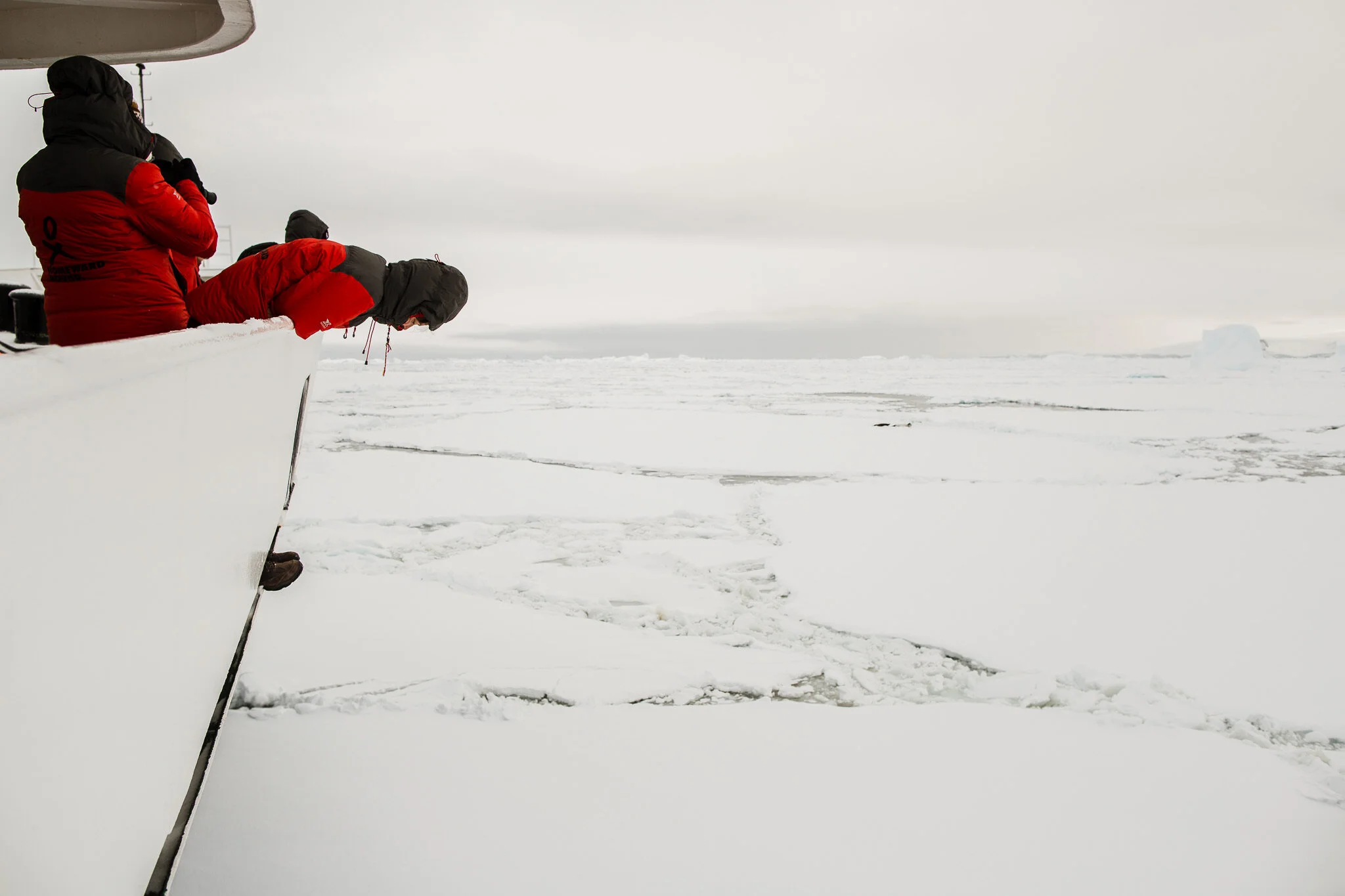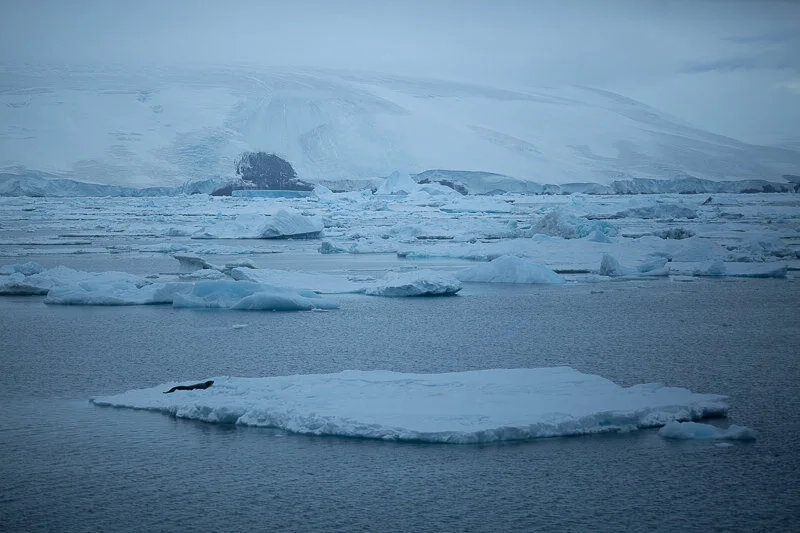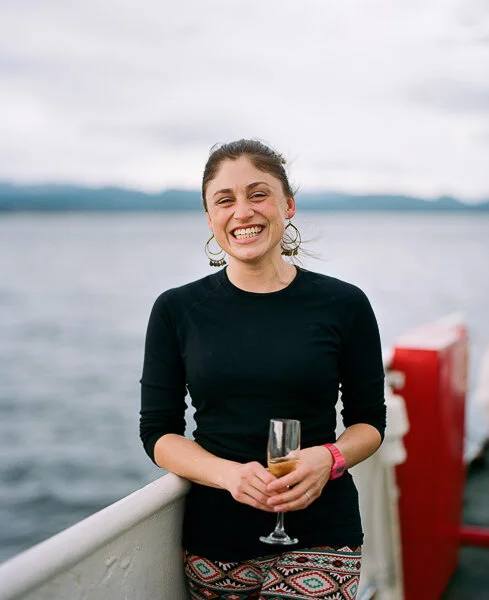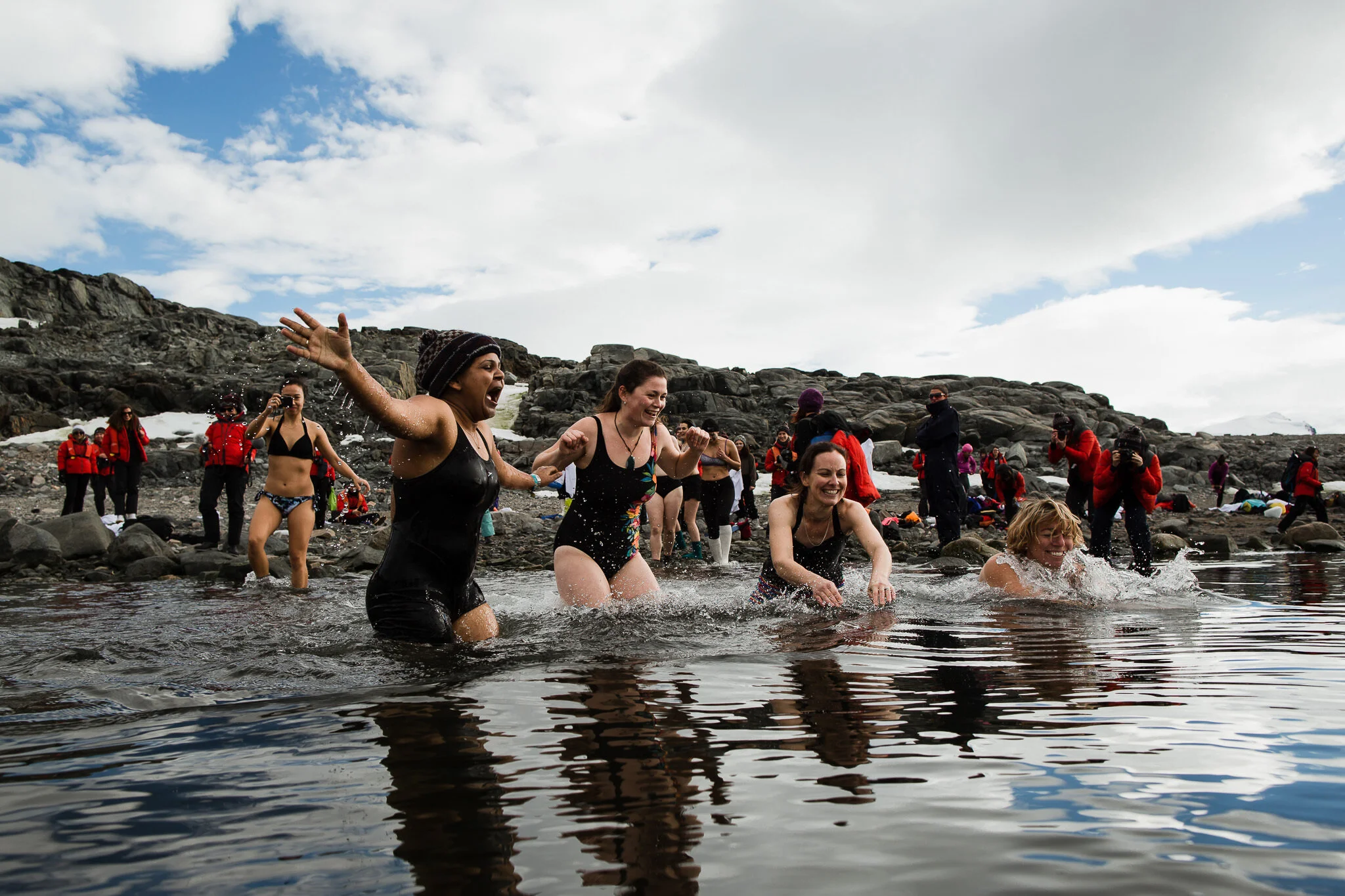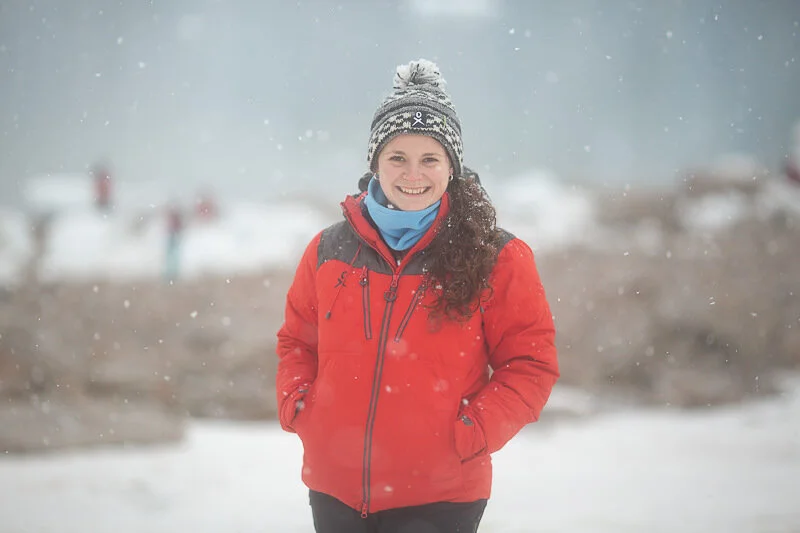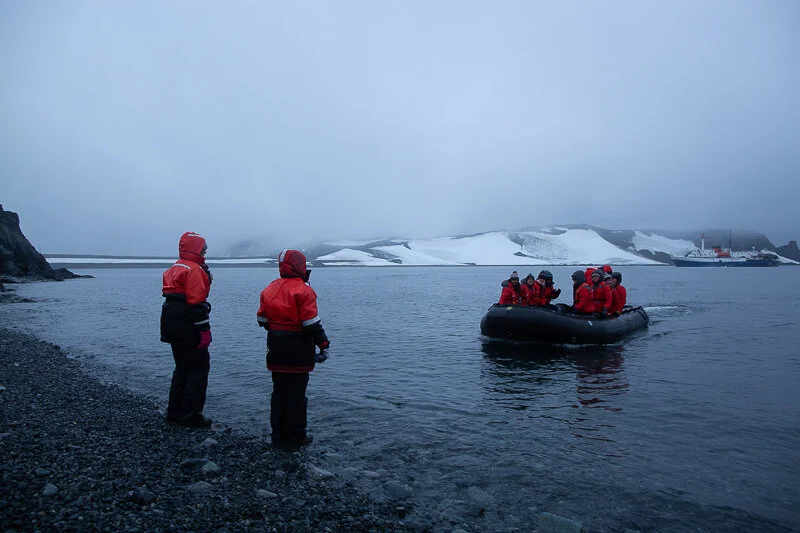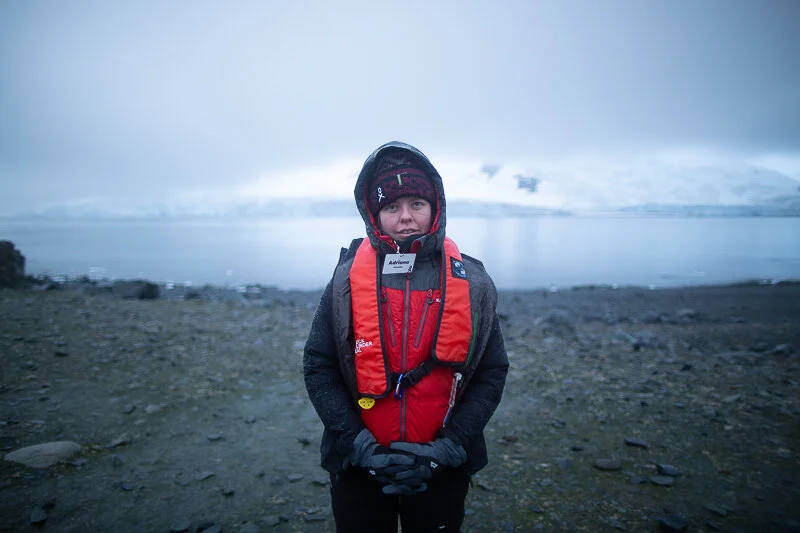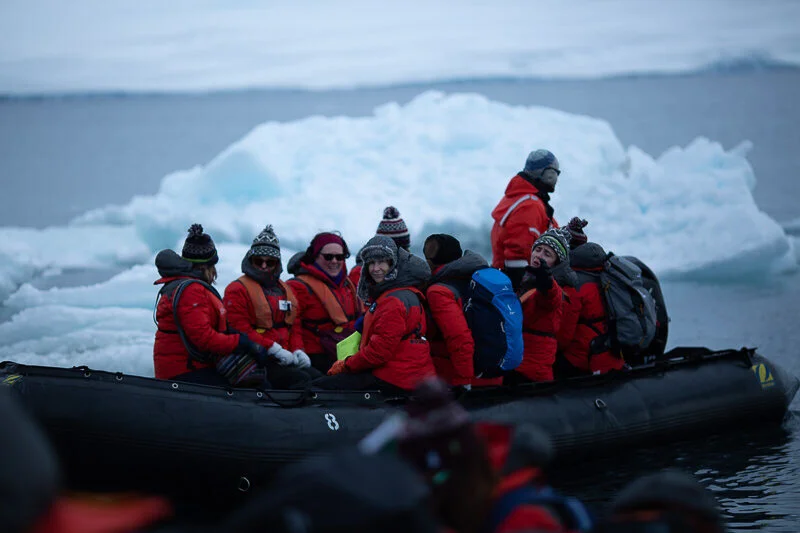So what does this all mean? And where does this energy go when you give it out into the world? We finally make it to our destination: Rothera Base Station. The journey is complete. But how do you reflect on this, now that we’re living through a global pandemic? Antarctica has never felt so far away. Put the two of them together, and what you get is a transformational learning experience.
Read along, or click one of the buttons above to listen along the journey to Antarctica and back with 90 other women on this incredible expedition
Captiavted by the Mink Whale in the Southern Ocean- photo credit Oli Sansom
What Happens After the Journey to Antarctica [0:00]
Fabian: So what is it we are learning, what is the “there” that we’re heading towards?
What the fuck are we trying to do? Why are we trying to do it?
You come to a city like New York and everything’s so big, you think, is this the system we’re trying to change? Is this the place where, you know these buildings that have been set to last for such a long time, we’re actually going to change the mindset of the ants and live within?
What a myth.
Maybe we should just sit back enjoy our lives with our families and watch us do what, you know, inevitably we’re going to do to ourselves, and our planet. Nature will bounce back one and a half million years from now. It’s just a question of whether or not humans will be there or if we are, in a very different state. And so no matter how much good is happening in our world, we have more food, fewer wars, etc. This is like this heaving thing that we’re living on the surface of.
And we aren’t paying attention to the fact that it’s not well.
Sam: That was Fabian and I sitting at Chelsea Piers, in New York City, where we met up about three months after Antarctica.
This was us sitting and talking through memories, me digging in with more questions.
We were both at the same stage: Something big was behind us, and we wondered, where does all that effort go when you give in to the world?
And then, for me, I needed to make more sense of The Moment. The blind vote, that Fabian convened.
What lingers and what’s still to come, long after we all move on from this story.
This is the final episode of this series….maybe even of this podcast.
And like always, I’m going to bring you right back to the ship, but this time, I’m going to give you a sense of where it all left off. And maybe even, what it all means, at least for me.
I hope you’ve enjoyed this series. It’s been the story that managed to get made, even when all the odds were stacked up against it.
And, one last appeal:
I’m here wIthout a giant marketing budget, without the backing of an industry giant, and so truly the only way for this story to get out there is by word of mouth...by your suggestions and reviews.
So please, if this hit you, do share it.
Thank you, for coming on the ship with me, and thank you for sharing.
One last time, let’s go back on the ship.
Greg Mortimer: Ah, if I can I get your attention round. Just to orient your mind maps, last night we headed a little bit North to safely spend the evening and night. And in the early hours of the morning, we headed back South, to where we were yesterday, to the ice edge. The wind came up this morning and it’s quite strong.
It’s a watch-and-wait event. Quietly optimistic that we’ll get out in the zodiacs.
But if we could gather you all in the lounge at 9 o’clock to set the scene for the day, that would be terrific, so see you at 9 in the lounge.
Sam: It felt like a year ago, but last night was the vote, just 12 hours ago.
By the time I crawled into bed, it was really late.
But it was a difficult night. The ship felt like it was in rough seas, and I spent most of the night listening to someone barf in the room next to me.
Fin Del Mundo (End of the World) - photo credit Oli Sansom
The Blind Vote Being Turned into a Learning Experience [3:46]
LA: Good morning ladies, and welcome to another spectacular morning in Antarctica.
Sam: One of the coaches on the faculty, Lesley-Anne Houghton, whom we all called LA, led us into this difficult morning.
LA: Not everyone’s had a great night’s sleep. So, this morning we’re going to be gentle and kind with each other. This is a time of the journey where emotions are coming up. I know for me, I was incredibly excited to learn that I had a clean thermal top that I had forgotten that I had packed. It really just set my day off quite well.
And then I stand myself before you, even through some of the difficult things.
Last night was a difficult decision, a difficult process to come through.
What I was very present in the room was the kindness and support and care that we all had for each other. And that’s a really wonderful thing and a wonderful thing for us to continue to grow.
And in that spirit, bringing forward that love and gratitude, I’d like to invite Open Frame. So invite you to share what might be present for you now. What you might like to bring to the group.
Sam: And then we opened the floor, as we have on so many other days, to Open Frame, to let it all out.
Dr. Karen Alexander bravely took the floor first.
Karen Alexander: Thank you. Yesterday was probably the worst day I’ve had since I got on the boat, and that’s for a bunch of reasons. First of all, I moved from upstairs to downstairs, so I’m sure a lot of you know what that means.
And then we had the discussion and the decision that we did last night.
I’m bringing it up because I’m in a safe space and I feel like I can share my feelings with you. But also I’m bringing it up because it was my first real leadership challenge. I felt that I had to try and be present in the situation and stay in the Blue, and I actually feel like I achieved that. So today I’m actually feeling quite proud of myself. And I’m really grateful to Homeward Bound for actually putting me in that position where I actually learned something. So thank you.
*clapping*
Sam: This is Purvi Gupta.
Purvi: So, similar, trying to observe the process, I guess, the process we went through, and also reflecting on the thought process I went through and trying to localize some of the learnings in terms of leadership we’ve had for these weeks, days. We also talked about how women’s leadership is more collaborative, you know. I guess there’s a balance between collaborative, and being directive, assertive, or taking a risk. Maybe that’s something to think about: We need both, and we need a balance. One way of doing it, which might be collaborative, may not work in all situations. And is that something that can stop us from taking a risk? We should be inclusive and collaborative, but there might be times we might need to be tougher and take that risk, which might not seem like the thing to do.
*clapping*
LA: What I’m loving hearing is the application of the models, the frameworks, the things, our leadership learnings that we’ve been talking about, and now being given the opportunity to start to apply.
Sam: We’re going to dip back down to New York again for a moment
Samantha Hodder walking with the mic - photo credit Oli Sansom
The Antarctic Ballgown [7:43]
Sam: Now I know I’m in complete sensory overload, much like Antarctica
Fabian: Yeah, Rotheragate for me was such a defining moment. You know there are plenty of people whose instinct to go with the majority rule, I didn’t. My instinct, was, that if we can’t take all, can’t take any.
It was me who initiated the blind vote. It was me who goes upstairs and debates the fact that if a small number out of a whole doesn’t want to go, then it is not right for women to go.
And transformational change work doesn’t happen with a textbook. It doesn’t happen because you logically go A, B, C, D E, F, G.
We dealt with the anger that flowed from that, but the next morning, I wish we had fully recorded what happened. You may be the only person who recorded what actually happened.
Sam: The Open Frame discussion?
Fabian: That was transformational.
Sam: I’ve got it.
Fabian: The poems, the poetry, the ...
Sam: I’ve got it all.
Fabian: See that is a transformational moment. No matter how much you didn’t like it. You didn’t like the anger or the uncertainty. Guess what, that’s where transformation change occurs. It doesn’t happen, the clean, the tight, the controlled moments. It happens when you are forced to confront: I contributed to that, it was my anger, I didn’t have to act that way.
Sam: Yup
Sam: The microphone was passed around the room, and I can only share a selection of everything that was said here…
Gaia: And I realized the decision we took yesterday, and the way we took it.
Fern: And don’t miss the opportunity to enjoy the rest of this trip, regardless.
Sam: At the end of the session, Dr. Helen Corney read something she wrote on the ship.
Helen: I wondered if I might be able to read you something that I wrote a few days ago. It’s called Antarctic Ballgown.
There are sections of Antarctica,
with wide expansions of pure white ice
Sam: And it was too beautiful to let it go with this bad sound. So I got her to record it again from home.
Helen:
Majestic glaciers clothed in gleaming white ballgowns,
with sweeping swirls and flounces,
white taffeta, lined with blue petticoats,
flowing down to caress the sea.
Creating stunning contrast,
strong and bold, flashes of light against
the dark backdrop of the rocky ballroom.
Within these gleaming expanses lie huge open wounds.
Tears in the taffeta. Irregular, misshapen
long tentacle fingers splintering out into the perfection.
Look deeply into these wounds,
and one is reminded of the scarring that can occur within the human soul.
Deep aqua blue fissures, bleeding down into unfathomable depths.
Intense, beautiful, gaping. The essence of mourning, sorrow and heart-wrenching loss, fracturing the soul prizing it open with ruthless disregard.
These fissures are treacherous,
Succumb completely to them,
and you’ll land twisted, broken
and lost to this world.
*waves crashing into the boat*
A view of all the ice and glaciers - photo credit Oli Sansom
Drinking Whiskey from an Antarctica Glacier [10:57]
Sam: After all that emotion, all that transformational learning, it was time to head out on the zodiacs for a tour, through a frozen maze, full of dead ends and the broken-off bits of glaciers, and icebergs so old they looked like floating castles.
Greg: And let’s go and play with some ice! And to do that in an ordered fashion, somewhat, as I said on the daily program. Those with odd-numbered cabins, if you guys can go first, make your way to the haberdashery, go on the zodiac, they’ll be out for an hour, and then come back. Then, the even-numbered cabins and I’ll make some announcements about that and rug up because it’s quite cold.
Sam: Natasha is our position still south of the Antarctic Circle, kind of zone? Or are we south of that?
Natasha: We are south of the Antarctic Circle
Sam: It turned out that our zodiac driver, Natasha, knew a lot about the ice.
Natasha: Green, brown ice. And then you can also try and see some black ice,
Amanda Kirk: An elephant seal over there.
Natasha: Which would be floating on the surface of the water, just visible. And it’s actually not really black, but it’s transparent….it’s the densest of the ice.
Rebecca: It’s the whiskey ice!
Natasha: It's the whiskey ice, exactly.
Sam: So, that thing over there that looks like a rock, it’s not a rock.
Natasha: No, It’s not a rock.
Sam: Wow.
Yiting: Is it because of the density, as well?
Natasha: Yeah, the colouring of the ice is about density, light waves, and a reflection. You have the water reflection as well. And it’s the cloud cover. If you have a bright sunny day, most of this would like white. And if you have a cloud cover, you got this really nice blueish nice tinge. This one is quite dense. You can see it’s on the edge of being transparent.
Sam: After deep blue the next shift is transparent?
Natasha: Yeah, not actually after deep blue. It’s going from very white, if you have snow and a lot of air in the ice, this is the one that’s very white. Then you go through different shades of blue. The last step is, if there’s no air, nearly no more air bubbles in the ice, then you have the glass-like, transparent ice chunks.
Sam: We came back to the ship feeling cleansed of our cabin fever and happy to be off that giant emotional roller coaster.
We drank whiskey with the ice from a glacier.
When you hear the ice crackling in there, it’s actually the gasses, from the atmospheres, from thousands of years ago trapped in the glacier that is escaping. You can hear them. So you’re literally drinking time.
Cheers.
Veronique Florec: Ok, we can die happy.
Sam: And then, like the day could handle another twist, the Captain and Greg convened a meeting in the common room.
Greg Mortimer aboard the ship - photo credit Oli Sansom
Is Antarctica back on the table? [14:52]
Greg: Aye oi oi oi. A heady 24 hours we’ve had. And you know I nearly turned around this morning when it was windy and snowy, and it’s turned into this.
Now. Two bits of information that have come to us and changed overnight are important to us.
Number one is that we’ve heard from the base leader at Rothera. He says it’s wide open down there, no ice.
The second thing is that the weather forecast has changed, and gives us quite favourable conditions, tonight. So, now I had no idea whether or not it would open scars or wounds. But there are important changes, because they resolve some unknowns for us, and improve our conditions. So I think there’s a strong argument for us to go to Rothera.
*clapping*
And to do so safely and comfortably. And I know that risks, given the stuff, the beautiful stuff, and synthesized.
But hopefully on the upside. And I’m very very conscious of the sensitivities in and around that. There are individual sensitivities that are of great significance. But taking that into account, I would like you to go with me on this. And take that one on my shoulders.
But I’d like the Captain to help me explain the weather situation.
Captain: Well, thank you. My authority cannot be delegated or passed on.
Basically, the conditions are fine, to go down. I just want to show you where we are. So we are somewhere here, at the moment.
So the idea is to backtrack all the way up to the Antarctic Circle and go around this island. It’s about 12 hours, on the way down to Rothera.
We have some weather info, for tonight. This is the weather forecast for tonight.
Question: What does green mean?
Captain: Green means good. Red is bad.
So basically we will have Northeasterlies, 18 knots, following seas.
Question: What about the way back?
Captain: And for waves, next one, blue is good, pink is also good, so we’ll have following seas, basically. And you’ll see this one is fantastic, around here. And it’s free of ice. The leader of Rothera base was waiting for us, they are excited that we are coming. We have not replied to them and that was a good call from Julietta. We were like, let’s wait a little bit.
There is also the possibility to go alongside there, there’s a pier, there is a wharf. So it’s going to be a dry landing, hopefully. That’s basically the information that I wanted to give you, to reconsider, that I think, that we should go.
It’s a once-in-a-lifetime. Even for us, I mean this is very unusual. Because usually, the conditions down here are not favourable, let’s say, the ice conditions, are always hard.
The intention was to go through the passage here, you know on the way down to Rothera, but unfortunately, we had a lot of ice in all the channels. So that’s it, basically. Any questions?
Susan Scott: So would we go overnight and visit the base tomorrow, or still on the 5th? And then come back that night or something?
Greg: They are expecting us on the morning of the 5th.
*clapping*
Captain: Ok, alright….See you later.
Thank you, Captain!
Greg: So is that, is that fair to say that you are happy to go with me on this one?
YES!!
*Clapping*
Alice: Will it be a bit bumpy, should we take some drugs?
Greg: Will it be a bit bumpy? You know the sort of conditions we had last night? Like that, I expect, ok, you can judge from that. If you have any concerns err on side of caution, but I would suggest taking something light.
Alice: Can we get some pills, I’ve run out
MANY: Kwells, I've got plenty
Fabian: So anyone with spare Kwells, bring them down in afternoon tea and bring them down.
Nicole: I just wanted to say to everyone, I know that according to Greg, I’m in the calmest position in the boat. I mean there were a few of us who had this conversation yesterday. We’re happy to swap beds, sub out, RENT, but for those who are a bit worried, if it would put your mind at ease to be in a safer position, or a calmer position...not safer, less movement...Let me know because I’m happy to swap out.
Greg: As we’ve repeatedly seen in this environment, there’s a risk associated with these decisions. I think this risk is very much worthwhile. And in a calculated fashion, I think it’s a good one. But if anyone, anyone, has any concerns, really please come and talk to me about them.
Fern: And just to remember that if we hadn’t gone through this, we wouldn't have had the educational moment that we had or the orcas! So it’s ultimate.
Dr. Romy Zyngier celebrating on the ship - photo credit Oli Sansom
Fabian: That’s a lovely frame-up. We had something really wonderful this morning, that didn’t happen, and I reckon now might be the time for the team that was going to do it all.
Something to do with Romy…. Romy, come on, give us five minutes of it.
Hillary: I’ve been so teary today, it’s been such a roller coaster.
Fabian: So it’s the perfect time to do it.
Romy: No, I don’t need that. Ok, so. Bear with me, this is incredibly dorky but incredibly fun.
Romy: I’m to say, ha, and you’re going to say Ha. I’m going to ha ha. Ha ha.
HAHAHAHAHAHAHAH
Sam: It would have been impossible to script that any better….ending the meeting with some laugh therapy, after a doozy of a day, when it was still only noon.
That night we all took our seasickness dose and buckled down. It was not an easy night, although there had been worse.
And the next morning we woke up in Marguerite Bay, which was like passing through the looking glass.
The water in the bay was flat and crystal clear and flat.
Fresh snow on the mountains, a bright sunny day. It was all, all perfect.
Walking along the shore, I spotted the Captain ahead of me, so I ran to catch up with him.
Taking the Polar Plunge in Antarctica - photo credit Oli Sansom
We Finally Made it to Rothera [23:40]
Sam: Captain, we made it!
Captain: We made it!
Sam: Are you pleased?
Captain: Absolutely.
Sam: You ordered up a pretty decent day for us as well.
Captain: Yes of course….it’s part of the package.
Sam: Yeah. What an incredible place.
Captain: I like to say to everyone - I told you so.
Sam: Laughing….Well, there might be some of that. It does help that the day couldn’t be more perfect.
Captain: Oh, it’s amazing. This is very unusual, actually. That’s why, we knew the weather was fine, and there was a way to go.
Sam: Well, you found it. We’re all happy that you found the way.
*walking*
Sam: Oh my goodness the polar plunge is happening and I can’t make it there fast enough…
*sounds of people diving into the water and shrieking*
Sam: And then, after all of this, after all the emotion, all the back and forth, the meltdowns, the tears, the clapping, the cheers, we actually made it to Rothera.
Sam: Ready to go.
Helen: Corney, Yup, you’re right.
Sam: It’s so funny to actually walk off the ship…
Helen: Well, I’m glad I put a pair of leggings under my jeans because I wasn’t and now I’m glad.
Sam: The required boot clean. Second biomat. Ok. Solid ground.
Nicole: Samsamsamsam are you coming with us? Your letter is near ours.
Sam: I think so.
Jessica: It’s kind of hard to imagine that this is what everyone was getting so upset about….
Sam: Jessica!!
Jessica: It’s like, be careful of what you wish for is what I’m thinking...hahaha... sorry….
Sam: Look, they have a rope tow or something over there.
Nicole: Did you not, not, though, get like, a little bit excited, when the announcement, when Greg told us that there are only two groups that come through here every year? Is there not?
Jessica: Yeah, I’m just, you know.
Sarah: Putting it in context
Jessica: Putting in the context of the bleakness of this spot at the present moment
Sarah L: There’s not even any penguins, like what the hell
Nicole: But it looks like that real Antarctica, that remoteness feeling to it, I think
Sarah: Except remote, with like a tractor
Jessica: I’m actually, I’m ambivalent about field stations. You know, just having such a strong footprint. You know. But yes, we’re here.
Sarah L: Yeah. Yup. We made it.
Sam: Doesn’t the Union Jack flapping in the wind there do a little flutter in your heart?
Sarah Lucas: No. *laughter*
Sam: Jessica!
Jessica: Sorry!
Nicole: I thought it was quite relevant and puts it all into perspective that really this is just a little blip on the radar of this whole place. Like, the little flag that’s on top, signifies a lot, but doesn’t really mean that much.
*footsteps*
Nicole: How do you feel about being here?
Sam: Well I’m excited to reach...if I thought the end of the world was Ushuaia, and then I thought the end of the Deception Island, and then I thought the end of the world was touching the continent...I’m pretty sure this actually is.
Nicole: The end of the world…
Sarah L: Definitely not...
Sam: It goes further, but then you go round the horn, you’re going back West. So, as South goes….
Nicole: It’s pretty fucking far South.
Sam: And so we got to where we had been heading all along - the journey was complete.
*footsteps*
Sam: The Rothera Research Station, The British Antarctic Survey. It’s very formal sounding, isn’t it?
Nicole: Oh, of course, it’s got to be all proper! Representation of the Queen!
*footsteps*
Nicole: Oh, the lab!!
Sam: Oh the Bonner Laboratory
Nicole: It’s got to be said proper, the Bonheur, the Bonheur.
Sam: These are pretty fancy buildings, actually. Quite new. Corrugated aluminum. Nice two-tone green, even style points with the red windows.
Nicole: Contrasting tones...
Sam: Beautiful! Actually, my house is painted a similar colour!
Sarah L: Really? Does it make you feel you’re at home?
Sam: More or less.
Nicole: It brings some green into the bleak environment
Sam: Oh, here’s an old mushing sleigh...I wonder what? I guess they move stuff around on them, maybe, but not with dogs?
Sam: And yeah, I was fantastically interesting. We met many scientists, got a full tour of their base, and learned how they live in tents while they’re on research missions, just like the early explorers did…
When I was leaving, it occurred to me that more people have summited Everest than have ever been to Rothera.
Nicole Fetchet at Rothera Base Station - photo credit Oli Sansom
Reflecting on Women in Leadership [29:05]
*New York City Soundscape*
But I don’t really know what to do with that fact.
So I’m just going to hold onto it.
Sam: Emotionally done, auditorily done…
Fabian: I don’t know how you did that. I really don’t know how you did that. Because you were listening to or recording people from before breakfast till after dinner. Did you take any days off?
Sam: No.
Fabian: Any time off on any of those days?
Sam: No. Some parts of some days off when I didn’t record. I took the night off as my night off…But that was it. You know, you asked me what it was like to come home and how I’ve been feeling, and I think….it took me a while to realize how much I had absorbed and how much I hadn’t absorbed.
Fabian: There are times that I’ve hated Homeward Bound. I’ve hated what it’s become. I’ve never felt so criticized, so personally under the microscope, so flawed in so many ways, as I have in Homeward Bound. But, you know, I’ve spent 34 years doing the work that I do. I’ve had a company that’s done global work. We scrutinize our work and evaluate it on a regular basis.
With Homeward Bound, it was very far from that in the first round. And I found that. You know, put it like this. People just massively don’t see the work that’s involved.
So last year, HB was short by $20,000. Where is that money going to come from? From me. There’s no one else to turn to. So not only have I put thousands of hours into it, my company has subsidized, we’ve paid its rent, telephones, equipment, and then I’ve topped it up. In order to hear a level of, sometimes quite abusive criticism, that I’m gobsmacked would be delivered to somebody who’s trying to help you. And you know I’ve learned to say a few things to myself. One is, where there’s smoke, there’s fire, have the courage to look at yourself and work out what you can do differently. And you can’t ask others to go through a transformational change if you’re not willing to yourself. So listen with as much grace as I can.
But then I’ve come to learn some really complex things about women. And there've been times, certainly in the last six months, where I’ve thought, oh my god, if I’m stranded on a desert island, I truly hope it’s with men. I do not want to be stranded with women. And certainly no more than two. And I hope I can choose those two or three that I’m stranded with. But, geez.
There are times that I’ve just gone: Why are you being so cruel? Why are you being so unkind? Where is your responsibility to say: Just, can we hit the pause for a moment? Can I give you some feedback, or can I give her some feedback? So I’ve seen some things in women that I don’t like. Probably confirmed for me that men and women should work together.
Fabian: What do you think? And you’re not just a journalist. You shouldn't pretend to be. Yes, you can capture the narrative, but you’re in this narrative. Willy-nilly you’re part of the narrative. You can’t sit objectively to one side. You come to the table with your opinion.
Sam: I didn’t go into this with logic and a plan. I went in with a plan to make a 20-minute story. I didn’t go in with a notion that I would spend.
Fabian: The rest of your life telling this story.
Sam: I’m not giving the rest of my life to it yet. But I’ve got two years under my belt...of having given a whole lot of time and energy and thought to this. You know it’s funny, I’ve spent a lot of my life looking for the right kind of story to tell. And I actually think it took me 20 years to figure out what it is I write about. And it happened to sort of land on this.
So while I went in to make a 20-minute story, and it turned into a three-hour epic. And I did this from my kitchen table, off my hard drive, with zero dollars funding, and you know, lots of goodwill.
Fabian Dattner at Horseshoe Bay. Photo credit: Samantha Hodder
Fabian: But listening was never enough for you. Listening was never enough. You started the first podcast by putting yourself in the story. That’s where it started. You’re not a bystander. It’s a myth for you. You’re in boots and all.
Yeah, I can remember being told, once upon a time, that when there’s a war to fight, no one wants to go to war. And no one really knows when they’re called, and most people are afraid. But guess what, you got called. I don’t know if you or I, either one of us, will get any accolades, but we got called.
I think this is the underpinning narrative where ordinary people are called to action. And we
And we live in an era where we need to know that ordinary people can make a difference.
There are just ordinary people who come to Homeward Bound, and they come with all the complexity and argument and problems that extraordinary people.
Sam: I don’t know if I actually agree. Antarctica with that. They’re not ordinary people! They are. They’ve defied the odds. They have a Masters or PhD level of education….there was a Nobel Laureate on board, there were Rhodes Scholars, there were numerous people who have been to Ivy League or high-ranking, Oxford, Cambridge….Come on, these are not ordinary!
Fabian: Alright, delete that one. I’m back peddling, I agree. 100% you’re right.
Sam: They are extraordinary people doing an ordinary thing.
Fabian: They are ordinary people who have gone against the odds...I mean, our Nobel Laureate is indeed an extraordinary person. But I would say that most of the Homeward Bound women show how to process the issues they deal with. They’re like every other person I’ve had to deal with. There are no themes on Homeward Bound that I deal with that are any different from the themes that I run into with working women in many quarters.
Sam: I know what you meant, that strip down all their titles, and job descriptions, and all of their fancy educations, that at heart, they are ordinary people. That’s what you meant.
Fabian: Thank you. Yup. And they’re dealing with the same issues.
Sam: But it’s actually, hard, I think I was quite starstruck for a period of time. I arrived in Argentina with a pretty substantial imposter syndrome feeling of: How was I going to keep up...
Fabian: Yeah, but you know what happened, 80 percent of them felt the same way that you did.
Sam: I don’t need sympathy, I’m just saying, it’s a woman’s job to feel like they’re an imposter in the place that they are in.
*laughing*
Fabian: Yeah, exactly….I feel like an imposter! I agree!
*waves lapping on the side of the boat*
Getting off the zodiac in the Southern Ocean - photo credit Oli Sansom
Antarctica is a Place that Changes You [36:09]
Greg: Um, I’ve left Antarctica a lot of times. And I’ve found that I’ll never know what I’ll feel like when I take the first walk in the streets of Ushuaia. It becomes a bit of a mystery. And it changes from time to time.
And it’s too late for you guys, Antarctica has already changed you already. Locked and loaded. I’ve found it useful not to hang on to the desire to go back to Antarctica, or to be back in that space, too greedily.
And it’s in you now. And it pops up when you need it. You know that it pops up when you need it. And with that, you can relax with it.
Walk around and feel a distance from what’s going around you if you like, almost. That’s quite potent for me.
Sam: At the end of a cinema verite documentary, there’s often no obvious conclusion drawn--it was a moment in time, and that moment ended, and thus, so did the film.
And while I love this for film, for a podcast, I still feel like I need to wrap, with some music...
There we go. I’ve spent a long time with this story - more than five years - and while this story gestated, many significant chapters of my life have unfolded around me, and they’ve all taken a turn to colour what it all means.
When I began to follow this story, yes, I had a dream to go to Antarctica. But to be fair, it was more than just going there. It was The Whole Package: Getting to go to this place, with this bunch of people, who were all doing for a purpose - a journey.
My instinct told me that GOING would put me inside a story that would grow and unfold, in real-time.
While I was on the ship, trying to figure out what it all meant, what the vote was, my first conclusion went something like this: the women made a choice, but then the men, the Captain and Greg, were the ones who actually got to decide. They were, after all, the two men actually in charge of this vessel.
Was this the grim, but nonetheless natural turn of events? It seems that somehow, in the end, patriarchy triumphed. And maybe in the face of danger and fear, we retreat back to our known territory.
And then revel in how good that felt. Recall, we cheered when the men told us that we could go, which meant that the decision we had so painfully made, with our vote was invalidated.
Once I got home, after I had some distance from all of it, I began to move away from this conclusion.
While this was factually true, it didn’t actually take into account all the underlying conditions. It didn’t value the learning that preceded that decision that had preceded the decision. And worse, it ignored the triumphs.
Why didn’t I value the fact that these women had pulled together in a difficult moment?
What about the trust that was built?
And what can we learn from this open system of communication?
Was I saying that this all vanished? That the men took it away?
No. It didn’t vanish. In fact, in many ways, the vote allowed a change of decision.
These women weren’t the victims of a patriarchal environment. In fact, they were empowered, and they had stopped that traditional chain of command if only briefly, had their voices heard, and changed the outcome of the story.
Who am I to take this win away from the victory, by concluding that the men had triumphed?
And so I shifted, and here’s where I landed next.
If women could stop being shitty to each other, good things can happen.
And, I could start with myself.
But this conclusion made me feel dark inside. And I worked really hard to avoid it. I kept writing it and then deleting it, recording it and then taking it out. I had to examine how I was part of the problem.
Meanwhile, out in the world, it was 2018 and then 2019. Looking back at this time now that we’re living through a global pandemic, these years feel different, like we didn’t know how good we had it then.
And then the world took a crazy turn, through many lanes of oncoming traffic, and we landed in 2020, and it’s probably fair to say that it took us all by surprise.
These last two years, watching my children go through their adolescence in lockdown, doing remote school, reflecting how everyone, though clearly not in equal measure, was, and is, knowingly affected by the same thing.
It’s all brought me to a quiet place inside.
Specifically, it brought me back to Antarctica. At a time when it felt like everything around me was breaking, I had that memory, that experience, to draw from.
And at some point, after a bunch more reflection, I landed on this new, and final conclusion, that I want to share with you.
What that was, and what this is, are the same, when you boil it down. It’s a transformational learning experience.
Right now, no matter where you live or what you do, you’ve had to, or you’ve chosen to, make some big changes to your life.
For me, it was from an odd experience of this blind vote, after nearly getting stuck in the ice, in Antarctica, and then brought back through the experience of living through the pandemic.
For you, it could have been anything, that’s not the part that matters.
Here’s what does matter.
Those things that we think we are powerless to, inside of a difficult experience, you’re not.
The moments they, live and breathe, and the stories, they stew inside of you, until you liberate them. That is your power.
When the moment passes, when you go back to your new normal, you get to decide if you will walk away from it, or walk with it.
And, what the next part of the story will be.
Adriana Humanes on land in Antarctica - photo credit Oli Sansom
The End of the Transformational Journey to Antarctica [43:01]
Sam: Here we are at the end, and I really want to thank you, from the bottom of my heart, for sticking with this story. It truly means the world to me, and I’d love to hear from you. Find me on Instagram or Twitter and drop me a DM, and I will write back.
To all the HB2 ladies, remember when we were on the ship and I did my Symposium at Sea and I explained how we were going to make this story together?
Whether or not your voice appeared in this series, I need you to know that you’re part of this story as well. And I couldn’t have done without you. And, thank you.
This story was written, hosted and produced by me, Samantha Hodder
Sound mix by Kristie Chan
Original music by Poddington Bear
Original theme song by Gabriel Corindia
And now that we’re at the end of this story, I want to share a secret with you. I made this for almost zero production dollars. The industry price of this runs about $150k. I didn’t have that kind of budget.
So please, if you loved it, share it.
For this episode would like to thank the following people:
Dr. Joanna Young, who taught me about the whiskey ice
Fabian Dattner
Lesley-Anne Houghton
Dr. Karen Alexander
Purvi Gupta
Dr. Gaia Dell'Ariccia
Dr. Fern Wickson
Dr. Helen Corney
Greg Mortimer
Captain Valdimar Vickman
Natasha Mier
Yiting Wang
Amanda Kirk
Veronique Florec
Commander Rebecca Waddington
Dr. Hillary McManus
Dr. Romy Zyngier
Professor Susan Scott
Alice Rhuweza
Nicole Fetchet
Dr. Sarah Lucas
And Jessica Brainard
I’m Samantha Hodder, and This is Our Time.
Women on the zodiac in Antarctica - photo credit Oli Sansom




